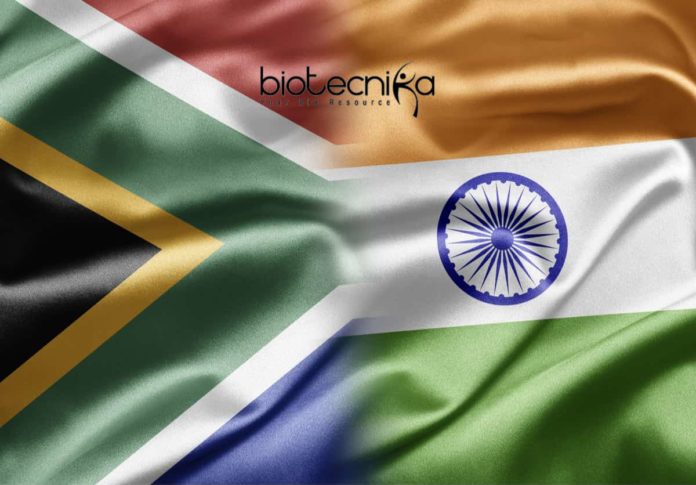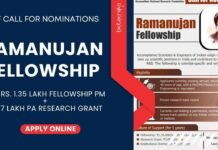India South Africa Joint Science & Research Collaboration 2019
The announcement for the 6th bilateral call for joint research project proposals between South African researchers and their Indian counterparts has been released. Interested and eligible candidates can check out all of the details regarding the same below:
This call expires in :
SOUTH AFRICA / INDIA JOINT SCIENCE AND TECHNOLOGY RESEARCH COLLABORATION
CALL FOR JOINT PROJECT PROPOSALS
A maximum of 10 joint projects will be funded for this call
In line with the science and technology bilateral agreement signed between South Africa and India, the National Research Foundation (NRF), in partnership with the Indian Department of Science and Technology (DST), is hereby pleased to announce the 6th bilateral call for joint research project proposals between South African researchers and their Indian counterparts.
Aims of the bilateral programme
This Programme aims to:
- contribute to scientific advancement in both countries by funding joint research projects in specified research fields;
- provide an opportunity for researchers to cooperate in an international setting and to develop their scientific careers, support the advancement of basic and applied research; and
- contribute meaningfully to research capacity development.
Areas of cooperation
Only joint research
proposals submitted within the following thematic areas will be considered:• Advanced materials incl. manufacturing
• Biotechnology
• Renewable energy
Duration of the projects
The projects will be supported for a period of three years.
Who may apply?
- An application must designate two Principal Investigators (PIs), one in South Africa and one in India, who will bear the main responsibility for the project, including its technical and administrative coordination as well as scientific and financial reporting.
- The focus of the Programme lies on new international partnerships. Follow-up projects (i.e. projects that have already been funded under this programme with the same research partners) are not excluded but will not be prioritised for funding.
- Participation of an industry partner on both sides is encouraged. However the industry partner in the project is expected to meet their own costs of participating in the project.
South Africa:
This call is open to working researchers residing in South Africa and affiliated with a recognised higher education or research institution such as a university, university of technology or science council. The private higher education institutions are not eligible to apply under this programme. The South African PI must be in possession of a PhD. South African applications from previously disadvantaged individuals and the involvement of historically disadvantaged higher education and research institutions will be prioritised.
Please Note:
Joint projects that involve young and emerging researchers and pay attention to a balanced
involvement of female and male researchers (gender equality), will be positively considered and will receive a higher rating.
India:
Indian PIs should be scientists/ faculty members working in regular capacity in universities, academic institutes and national research and development laboratories/ institutes. The Indian PI should not be retiring or leaving the parent institute during the proposed duration of the project. The Indian scientist involved in any way implementation of two or more projects supported by DST (International Group) and are not expected to be completed by March 31, 2018 are not eligible to be a member of Research team/PI.
How do I apply?
It is up to the applicants to find their own research partners. Proposals must be received both in South Africa (NRF) and India (DST). Proposals which have not been received in both countries will not be considered for funding. The call process is highly competitive therefore application does not guarantee funding. The evaluation of applications from both countries should have positive ratings before consideration for funding. Both the NRF and the DST India will not be held responsible for nonsubmission, administration or evaluation of the application in the partner country.
South Africa:
Applications must be submitted through an online application process to the NRF on the NRF Online Submission System at https://nrfsubmission.nrf.ac.za/. The NRF Online Submission System will open on the 1st week of February 2019 for submission of joint research proposals.
India:
Interested applicants should:
- Submit their proposals on format available at www.onlinedst.gov.in by 5:30 pm on September 23, 2019. After registration, they should move to a scheme and format section where details about this call would be available in the International Cooperation (bilateral). An email acknowledging receipt
of the application will be provided to the applicant in 3-5 working days. - Applicants are also requested to submit one hard copy to DST by September 30, 2019, on the address given on contact details below.
- Applicants should ensure that their applications with identical titles have been submitted by their South African partners to the NRF by the due date.
- Only applications endorsed by the competent authority will be accepted.
Which activities may I apply for?
The purpose of this call is to support joint research and short-term exchange visits by senior researchers, scientists, postdoctoral and doctoral students between the two countries. Funding will, therefore, be made available for exchange visits of leading and young scientists, technical personnel or other experts conducting joint research within the above-mentioned thematic area of cooperation.
Support will be provided for collaborative basic or applied research projects. The NRF will cover expenses incurred by the South African researchers and the DST India will be responsible for expenses borne by their researchers.
The following activities will not be funded from the NRF and the DST India funds allocation:
• Consultant’s fees
• Large equipment
• Project management fees
• Salaries and temporary staff fees.
South Africa:
Research activities supported by the NRF grant for South African researchers are as follows:
• Research-related costs
Activities to be supported may include expenses relating to fieldwork, research-related trips, and small research equipment. The funds can also be used for consumables, accessories, publication-related costs, etc. Up to a maximum of 25% of the budget may be utilized for small equipment, consumables and accessories.
• Exchange visits
These include short term travel expenses of the research teams between the two partnering countries. In the case of these meetings, research visits and exchanges of scientists, personnel and experts, as well as reciprocal visits undertaken as part of joint research projects and the attendance of workshops, seminars, symposia and other meetings funded under this partnership, the sending side will be responsible for all expenses associated with their travel (i.e. international travel, visas, medical insurance, accommodation and subsistence).
• Doctoral fellowships
Each South Africa PI is allowed to offer one 3-year doctoral fellowship to one of their PhD
students within the project. Therefore, 1 doctoral student will be supported per project at
R120 000 per student per annum. However, it is important to note that scholarship support will be released on condition that nominated students meet the government equity targets
• Science engagement/ knowledge sharing costs
Each project is expected pay attention to the broader impact of their projects – i.e. to consider the impact of their activities/ projects on the public and/or targeted participants in terms of knowledge and/or awareness, behavioural and/or attitudinal changes, skills acquisition, etc. This can be done through activities such as joint workshops, seminars, conferences, symposia, lecture presentations, capacity building sessions, meetings, local/regional dissemination of results aimed at involving stakeholders, and/or end-users from outside the research teams, etc.
India:
Research activities supported by the DST India grant for the Indian researchers are as follows:
• Exchange visits, contingency, consumable and minor accessories
• Institutional overhead will be determined in accordance with specific research and development
program regulation of the Indian government.
• One student Fellowship (JRF/SRF/RA) for each project can be supported.
• A maximum of 30% of the budget may be allowed for consumables and accessories.
Funding modalities
Funding will be available for a maximum of 3-years for collaborative research projects jointly developed and completed by researchers on both sides. In both countries, all the approved projects will get funding support from the two parties in terms of the cost of activities mentioned above.
Apart from the financial support from the two parties, institutions and universities in both countries are encouraged to solicit other funding resources. Successful researchers will be funded only for the activities within the scope of this guideline. Both scientific and financial reporting on the project is OBLIGATORY. Research stays in both countries are OBLIGATORY.
Funding limits
South Africa:
The total amount requested from the NRF should not exceed R960 000 per project. Funding will be made available for a maximum of three years, to be paid in annual installments as follows:
– R200 000 per project per annum (total of R600 000) for research and mobility.
– R120 000 doctoral fellowship per project, per student, per annum (total of R360 000).
– These funds are exclusively for research activities/ and doctoral fellowships.
How are applications evaluated?
Following the closing date indicated below, applications will be submitted to recognised national experts in the various fields of research represented by the proposals received. These experts will evaluate each proposal based on the following broad criteria:
• Scientific quality of the intended research project.
• Feasibility of the joint research plan and the adequacy of the scientific method.
• Alignment with national priorities in each country.
• Reasonableness of the described further cooperation perspective.
• Project proposals involving doctoral students and female researchers (capacity building).
• Adequacy of the proposed knowledge sharing approach/ science engagement activities.
• From the South African side: researchers from previously-disadvantaged individuals/ institutions.
Please note that other national criteria may be applicable in line with the national policies and regulations of the partnering countries. Following national evaluation, a shortlist of projects to be funded will be constituted through consultations between the two Parties based on the results of the expert evaluations done in both countries. The project selection will be carried out at the Joint Technical Committee (JTC) Meeting. The minutes of this meeting (indicating approved joint projects for funding) shall be signed by both Parties to indicate a joint consensus on projects to fund.
Project follow-up and reporting
• A final scientific and financial report has to be submitted in English by both the South African and the Indian PIs no more than 3 months after the end of the project.
• From both the South African and Indian sides, successful submission of the first annual report is an obligatory condition of funding in subsequent years.
• All project reports must mention project outputs as compared to the objectives and aims of the proposal.
• The funders reserve the right to make the final reports available to researchers within and outside this programme in similar disciplines.
• The joint publications by researchers must mention the support from the funders (i.e. the South African Department of Science and Technology, the South African National Research Foundation, and the India Department of Science and Technology).
Intellectual property
The researchers of each country, particularly the PIs, must take adequate steps to ensure protection
and sharing of the intellectual property that could result from the joint projects.
Closing date for applications
South Africa
South African researchers must consult their institutions for internal closing dates. The cut-off date for the Designated Authorities (DAs) to submit applications to the NRF is 30 September 2019. Applications submitted to the NRF after this cut-off date will not be considered for review.
India
India researchers must submit proposals to DST portal on September 23, 2019. One hard copy of the submitted proposal should reach to DST by September 30, 2019, by 5:30 pm
Please note that neither the NRF nor DST India will be held responsible for applications that were not received. Researchers are also advised to ensure that their research partners’ applications are submitted and have also been received in the partner country.
Contact details for queries and further information
In South Africa
National Research Foundation (NRF)
For content related queries: Ms Nombuso Madonda
Knowledge Advancement and Support (KAS)
Tel: +27 (0) 12 481 4285
Email: [email protected]
For technical queries: Mr Jan Phalane
Grants Management and Systems Administration (GMSA)
Tel: +27 (0) 12 481 4157
Email: [email protected]
In India
Department of Science and Technology (DST)
Dr Sulakshana Jain
Scientist D,
International Bilateral Cooperation Division,
Ministry of Science & Technology,
Technology Bhavan, New Mehrauli Road,
New Delhi-110016
E-mail: [email protected]
View Notification & Download Application Format Below
Editor’s Note: India South Africa Joint Science & Research Collaboration 2019, Call for Joint Project Proposals 2019, India South Africa Call for Proposals 2019, make sure you check out the Biotecnika Times Newsletter, Podcast and all of our social media for the latest in the life sciences industry.









































